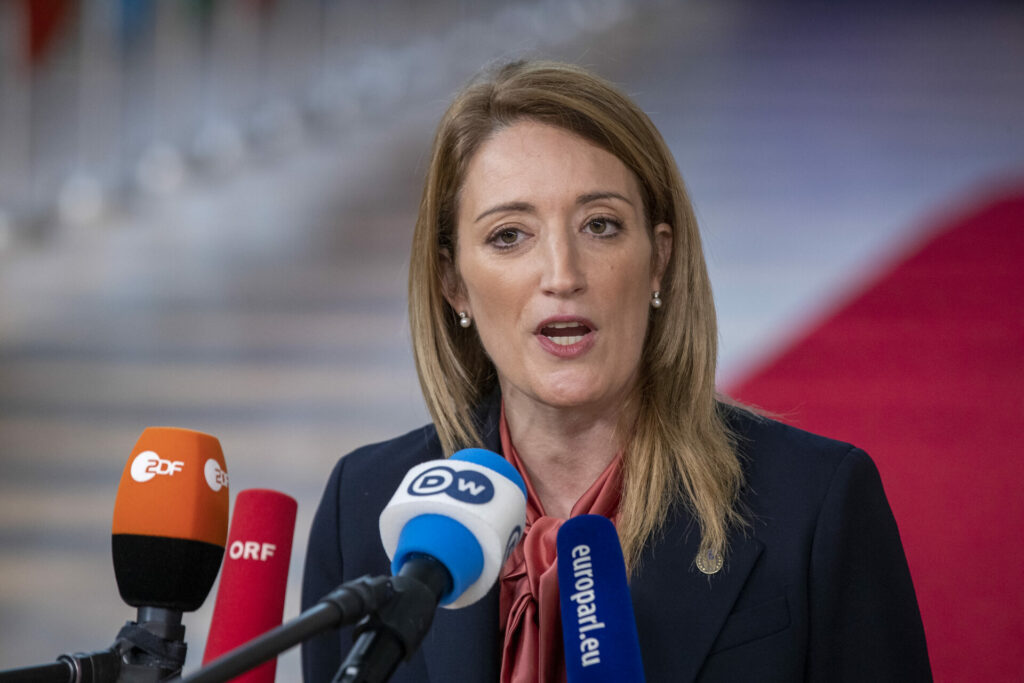European Parliament President Roberta Metsola has proposed a series of sweeping anti-corruption reforms to help the institution "regain the confidence of European citizens" in the wake of a corruption scandal that has profoundly shaken European politics over the past month.
The Maltese MEP's fourteen proposals, which have been seen by Belga News Agency and other news outlets, would introduce more stringent regulations pertaining to former MEPs' lobbying practices and force sitting lawmakers to be more transparent about any potential conflicts of interest.
According to Metsola, the new measures will "strengthen the institution's tools in terms of ethics, transparency, and conduct, and improve working relations with third countries".
The so-called 'Qatargate' corruption scandal — according to which the Qatari and Moroccan Governments are alleged to have made payments to various European officials in exchange for their support for pro-Qatari and pro-Moroccan policies — has already led to charges being brought by the Belgian authorities against four people, including current MEP Greek Eva Kaili and former Italian MEP Antonio Panzeri (both S&D).
It has also led to the European Parliament revoking the parliamentary immunity of two sitting MEPs, as well as the resignation on Wednesday of Belgian MEP Maria Arena (S&D) from her position as Chair of the European Parliament's Subcommittee on Human Rights (DROI).
A plethora of proposals
Under the new measures, all sitting MEPs and their assistants will be required to publicly disclose meetings with any lobbyists or campaign groups which discuss ongoing legislative work. Currently, only committee chairs and parliamentary 'rapporteurs' — who are responsible for overseeing the passage of particular pieces of legislation — are obliged to do this.
Furthermore, MEPs who wish to receive a parliamentary income after the end of their mandate (the 'transitional allowance') will be forbidden from engaging in any lobbying activities, while all former MEPs will be prohibited from obtaining a permanent access badge to the Parliament's premises.
Perhaps most significantly, 'Friendship Groups' — unofficial parliamentary bodies which discuss EU policies with non-Member States and which are often directly funded by foreign governments — will be banned.
According to Metsola, all of the aforementioned proposals could potentially be implemented within the next few weeks.
However, one measure which is expected to take significantly longer is the establishment of an independent ethics body tasked with investigating possible cases of corruption across all EU institutions. The creation of such a committee is explicitly supported by the Parliament's Greens and Left Group, but is expected to receive strong resistance from the centre-right European People's Party.
The heads of the Parliament's nine political groups are scheduled to meet with Metsola on Thursday to discuss her proposals.
Necessary — but sufficient?
The proposals received a largely positive reaction from transparency groups, with the Director of Transparency International EU Michiel van Hulten labelling them "a big step in the right direction".
"[These proposals] contain some long overdue reforms that we and others have been campaigning for for many years," he told EUObserver.
Nevertheless, van Hulten criticised the measures for not prohibiting sitting MEPs from holding second jobs, as well as for not including adequate provisions to ensure their enforcement.
"The Parliament continues to rely entirely on self-enforcement of the rules," he said. "We know that doesn't work."
Related News
- Qatar corruption scandal: Senior Belgian MEP resigns from EP human rights subcommittee
- Qatar corruption scandal: Panzeri and Giorgi manipulated EP hearing to shield Qatar
In a recent interview with The Brussels Times, Danish MEP Niels Fuglsang (S&D) noted that, while new rules governing MEPs' conduct are necessary, they will not be sufficient to prevent similar scandals from occurring in the future.
"We should obviously have new rules," Fuglsang said. "But, of course, if these accusations against Eva Kaili and others are true, then they already broke the rules. Obviously, it's illegal to be bribed. If people are willing to take money in suitcases, we can make a lot of rules but that might not necessarily prevent this kind of thing from happening."
He added: "So, we need to make rules, and better rules, but we also need to try to promote a different kind of culture. But that's not so easy. That takes a long time."

